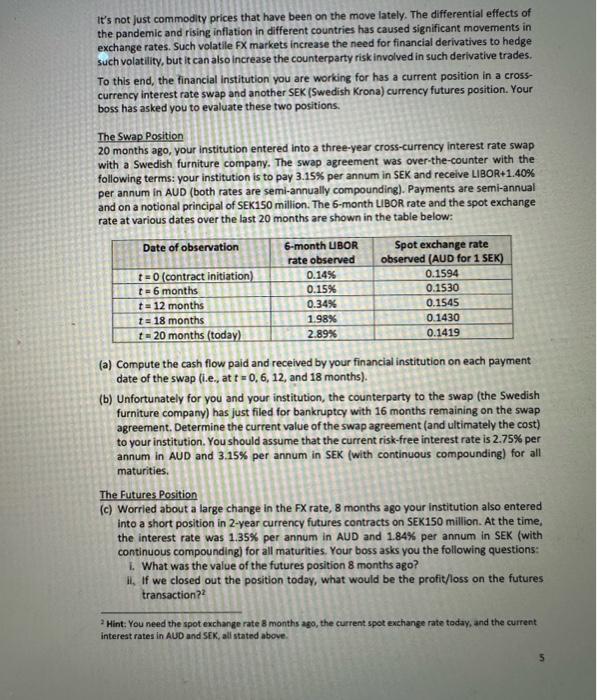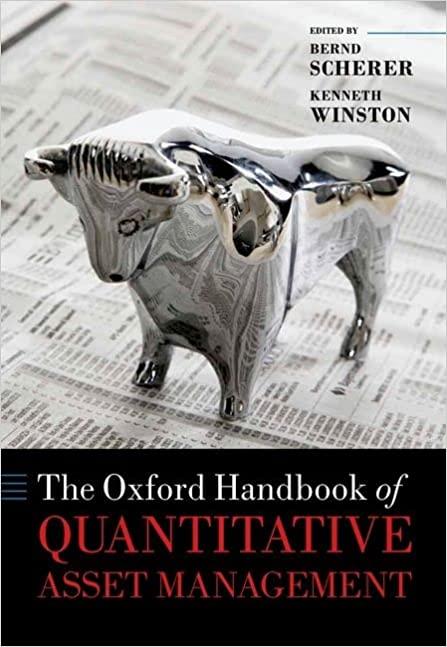It's not just commodity prices that have been on the move lately. The differential effects of the pandemic and rising inflation in different countries has caused significant movements in exchange rates. Such volatile FX markets increase the need for financial derivatives to hedge such volatility, but it can also increase the counterparty risk involved in such derivative trades. To this end, the financial institution you are working for has a current position in a crosscurrency interest rate swap and another SEK (Swedish Krona) currency futures position. Your boss has asked you to evaluate these two positions. The Swap Position 20 months ago, your institution entered into a three-year cross-currency interest rate swap with a Swedish furniture company. The swap agreement was over-the-counter with the following terms: your institution is to pay 3.15% per annum in SEK and receive LIBOR+1.40\% per annum in AUD (both rates are semi-annually compounding). Payments are semi-annual and on a notional principal of SEK150 million. The 6-month UBOR rate and the spot exchange rate at various dates over the last 20 months are shown in the table below: (a) Compute the cash flow paid and received by your financial institution on each payment date of the swap (i.e., at t=0,6,12, and 18 months). (b) Unfortunately for you and your institution, the counterparty to the swap (the Swedish furniture company) has just filed for bankruptcy with 16 months remaining on the swap agreement. Determine the current value of the swap agreement (and ultimately the cost) to your institution. You should assume that the current risk-free interest rate is 2.75% per annum in AUD and 3.15% per annum in SEK (with continuous compounding) for all maturities, The Futures Position (c) Worried about a large change in the FX rate, 8 months ago your institution also entered into a short position in 2-year currency futures contracts on SEK150 million. At the time, the interest rate was 1.35% per annum in AUD and 1.84% per annum in SEK (with continuous compounding) for all maturities. Your boss asks you the following questions: L. What was the value of the futures position 8 months ago? ii. If we closed out the position today, what would be the profit/loss on the futures transaction?2 It's not just commodity prices that have been on the move lately. The differential effects of the pandemic and rising inflation in different countries has caused significant movements in exchange rates. Such volatile FX markets increase the need for financial derivatives to hedge such volatility, but it can also increase the counterparty risk involved in such derivative trades. To this end, the financial institution you are working for has a current position in a crosscurrency interest rate swap and another SEK (Swedish Krona) currency futures position. Your boss has asked you to evaluate these two positions. The Swap Position 20 months ago, your institution entered into a three-year cross-currency interest rate swap with a Swedish furniture company. The swap agreement was over-the-counter with the following terms: your institution is to pay 3.15% per annum in SEK and receive LIBOR+1.40\% per annum in AUD (both rates are semi-annually compounding). Payments are semi-annual and on a notional principal of SEK150 million. The 6-month UBOR rate and the spot exchange rate at various dates over the last 20 months are shown in the table below: (a) Compute the cash flow paid and received by your financial institution on each payment date of the swap (i.e., at t=0,6,12, and 18 months). (b) Unfortunately for you and your institution, the counterparty to the swap (the Swedish furniture company) has just filed for bankruptcy with 16 months remaining on the swap agreement. Determine the current value of the swap agreement (and ultimately the cost) to your institution. You should assume that the current risk-free interest rate is 2.75% per annum in AUD and 3.15% per annum in SEK (with continuous compounding) for all maturities, The Futures Position (c) Worried about a large change in the FX rate, 8 months ago your institution also entered into a short position in 2-year currency futures contracts on SEK150 million. At the time, the interest rate was 1.35% per annum in AUD and 1.84% per annum in SEK (with continuous compounding) for all maturities. Your boss asks you the following questions: L. What was the value of the futures position 8 months ago? ii. If we closed out the position today, what would be the profit/loss on the futures transaction?2







